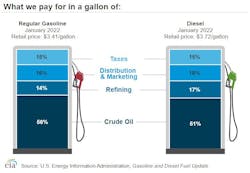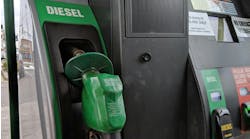Fuel prices rise as early sign of Ukraine war’s impact on U.S. trucking
The earliest impacts on U.S. trucking of the week-old Russian invasion of neighboring Ukraine are still being felt, but where they are sure to show up is in oil and fuel prices—and these continued a march upward, as oil and fuel surveys released on Feb. 28 showed.
At pumps in the U.S., diesel was up nearly 5 cents per gallon on Feb. 28, compared to a week ago, according to the U.S. Energy Information Administration (EIA). Averaging $4.104 per gallon in the U.S., the highest diesel costs on the East Coast were in the Mid-Atlantic ($4.309, up from $4.276 the prior week), while in California, diesel was up to $5.077, up from $5.051 the prior week. Gasoline jumped nearly 8 cents this week, averaging $3.608 per gallon in the U.S.
See also: Ukraine update: Understanding risks to U.S. trucking, transportation
Oil prices, a predictor of prices of refined fuel to come, also showed ominous signs. Some oil prices topped $100 per barrel on Feb. 28 as concerns about Russian energy supply disruptions pushed oil and fuel prices up in Europe and abroad. Russian crude makes up about 10% of the global oil supply. Goldman Sachs, also on Feb. 28, raised its one-month Brent crude oil price forecast to $115 a barrel from $95, Reuters reported.
Oil remains at highs not seen since 2014 at above $100 per barrel, according to oilprice.com.
There are already tight energy supplies around the world. The U.S. does not appear to be able to replace Russia’s supply if it were removed from world markets, and OPEC countries have not committed to increasing production, according to analysts.Regions march to the same beat: price hikes
Diesel prices elsewhere on the East Coast were elevated—New England (up to $4.158 from $4.076 the prior week) and the Lower Atlantic (up to $4.069 from $4.014 the week of Feb. 21). Diesel in the Midwest, price territory for cross-country trucking, was up to $3.968 the week of Feb. 28 from $3.905 the prior week. The fuel in the Rocky Mountain region surged to $3.976 per gallon from $3.931 on Feb. 21. The Gulf Coast had the cheapest diesel but was still up on Feb. 28: $3.872 compared to $3.830 on Feb. 21. On the West Coast, not including California, diesel rose to $4.295 from $4.256, according to EIA.
See also: Oil markets volatile amid Russia's invasion of Ukraine
Nations agree to release 60 million barrels
Meanwhile, the 31 member countries of the International Energy Agency agreed March 1 to release 60 million barrels of crude oil from their strategic reserves—half of that from the U.S.—“to send a strong message to oil markets: that supplies will not fall short, despite the Russian invasion of Ukraine, according to the Associated Press.
The board of the Paris-based IEA made the decision at the extraordinary meeting of energy ministers led by U.S. Energy Secretary Jennifer Granholm. She said in a statement that President Joe Biden approved a commitment of 30 million barrels and that the U.S. is ready to “take additional measures" if needed, according to AP. The group's “decision reflects our common commitment to address significant market and supply disruptions related to President Putin’s war on Ukraine," Granholm said.
Russia plays an outsized role in global energy markets as the third-largest oil producer. Its exports of 5 million barrels of crude per day amount to about 12% of the global oil trade. Some 60% goes to Europe and another 20% to China.
BP pulls stake in Russian oil company
British energy giant BP announced Feb. 27 that it was pulling its 19.75% stake in Rosneft following Russia's invasion of Ukraine.
BP's chief executive Bernard Looney also announced that he was resigning from the Russian oil company's board "with immediate effect".
Looney was one of two BP-nominated directors, having held the position since 2020. The other is former BP CEO Bob Dudley, who has also resigned, said BP.
"Russia's attack on Ukraine is an act of aggression which is having tragic consequences across the region," said the company's chairman, Helge Lund.
"BP has operated in Russia for over 30 years, working with brilliant Russian colleagues," he added.
"However, this military action represents a fundamental change."





